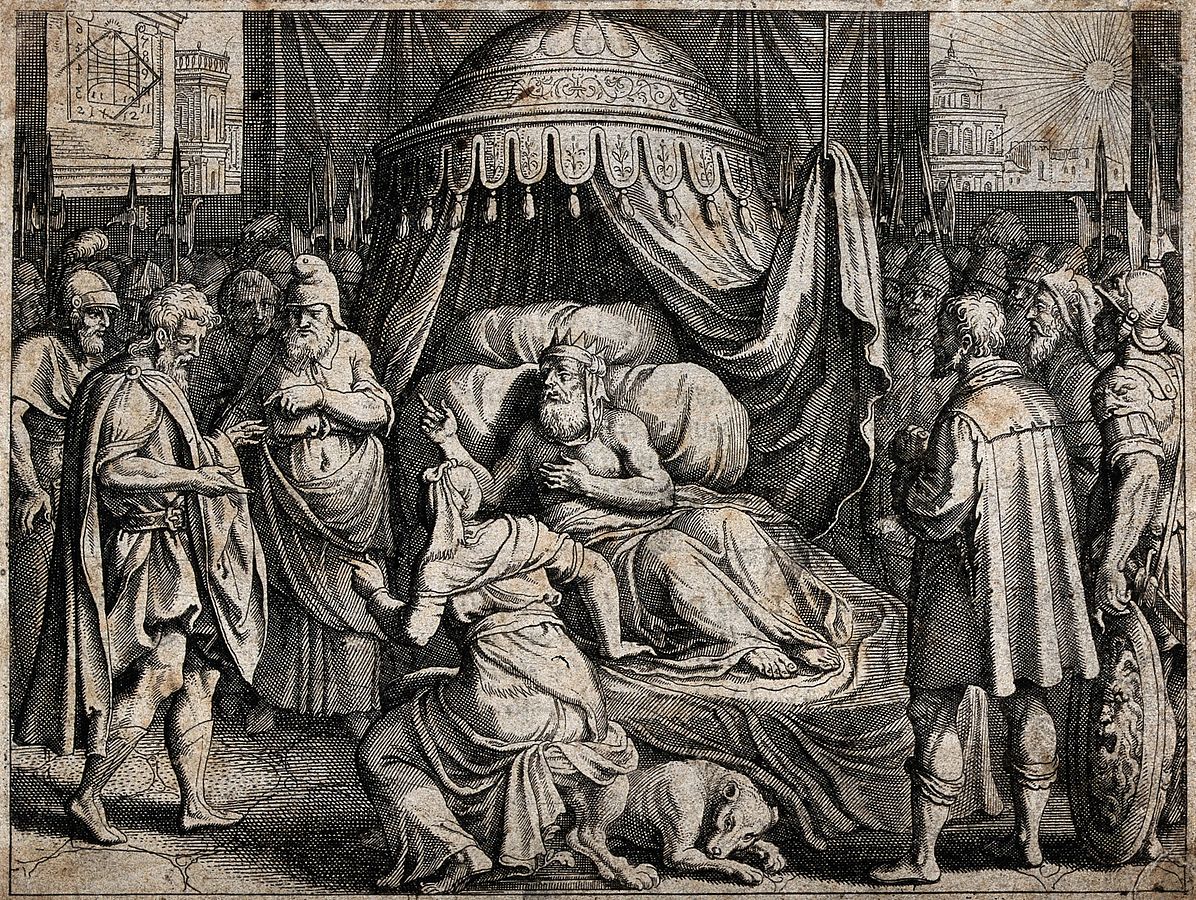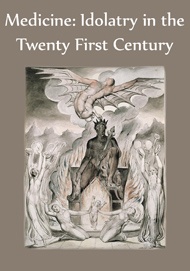
Hezekiah lies ailing in bed, surrounded by anxious soldiers and ministers. Engraving. Wellcome Library, London
In those days Hezekiah became ill and was at the point of death. The prophet Isaiah son of Amoz went to him and said, “This is what the LORD says: Put your house in order, because you are going to die; you will not recover.”
Hezekiah turned his face to the wall and prayed to the LORD, “Remember, LORD, how I have walked before you faithfully and with wholehearted devotion and have done what is good in your eyes.” And Hezekiah wept bitterly.
Then the word of the LORD came to Isaiah: “Go and tell Hezekiah, ‘This is what the LORD, the God of your father David, says: I have heard your prayer and seen your tears; I will add fifteen years to your life…’” Isaiah had said, “Prepare a poultice of figs and apply it to the boil, and he will recover.” (Isaiah 38:1-5,21)
The record of King Hezekiah’s life; his illness, his prayer, and what the Lord spoke to him, provide valuable insights for us regarding healing. Let’s take a look at some of the principles this historical account teaches us.
Healing Comes from God
First, healing comes from God, the one who created us. God also controls the timing of our physical death. Hezekiah developed some kind of sickness, and God sent word to him through the prophet Isaiah that he was not going to recover – he was going to die. Hezekiah then cries and prays to God. God hears his prayer, and decides to add fifteen years to his life.
After delivering this message from God to Hezekiah that he would recover, Isaiah then uses “a poultice of figs” to apply to his skin disease as a remedy. If Isaiah (or anyone else) had tried to use this natural remedy prior to the Lord declaring that Hezekiah was going to be healed, it would not have worked. God made the decision: Hezekiah and Isaiah just followed his directions.
Modern day science is based on the foundation of Darwinian evolution, and the belief that the universe is a closed system. It sees the universe in primarily physical terms. To have such a belief, one is forced to not believe in God or creation.
However, God does exist, and his existence is not limited to the confines of his creation, e.g. the universe. He also exists outside of it. Therefore the universe cannot be a closed system. God created it, and he interacts with it as he chooses. The historical records of the life of Jesus show that Jesus constantly defied “the laws of nature” by doing such as things as walking on water, turning water into wine, healing diseases, and even raising dead people back to life.
Unfortunately, modern day medicine and modern day naturalism/alternative health primarily base their systems of healing on the Darwinian foundation which believes in a closed system. Healing is believed to exist primarily within the physical realm. So the medical system trusts in its medicines, and the naturalist trusts in natural substances such as herbs, vitamins, etc. That these physical remedies do indeed have therapeutic value cannot be denied, even as people during the days of King Hezekiah and the prophet Isaiah probably understood that “poultices of figs” also had therapeutic value.
But as noted above, God had already spoken regarding Hezekiah’s condition, and no natural or man-made remedy could have changed that. Among all the medicines and natural remedies known to man today, none of them affect healing 100% of the time. People still get sick, and people still die.
God Hears Prayers and He is Moved by Them
The second major principle we can learn from this account of King Hezekiah, is that God hears people’s prayers, and he is moved by them. The fact that God can “change his mind” regarding future events is also documented in other places in the scriptures.
One of the best stories is the one of the prophet Jonah. Jonah was sent to preach against one of Israel’s enemies and go to the city of Nineveh. He tried to resist God, but that was futile. So he entered the city and proclaimed the word of the Lord, which was that Nineveh was going to be destroyed within 40 days because of their great sin. But as was similar in the story about Hezekiah, prayer was offered up to God, and God changed his mind:
When Jonah’s warning reached the king of Nineveh, he rose from his throne, took off his royal robes, covered himself with sackcloth and sat down in the dust. This is the proclamation he issued in Nineveh: “By the decree of the king and his nobles: Do not let people or animals, herds or flocks, taste anything; do not let them eat or drink. But let people and animals be covered with sackcloth. Let everyone call urgently on God. Let them give up their evil ways and their violence. Who knows? God may yet relent and with compassion turn from his fierce anger so that we will not perish.”
When God saw what they did and how they turned from their evil ways, he relented and did not bring on them the destruction he had threatened. (Jonah 3:6-10)
Sin and Spiritual Condition Needs to be Considered for Healing
Could it be that in the case of Hezekiah God was allowing certain things he had sown in his life to take their course in his illness until Hezekiah humbled himself before God and came to a point of recognizing his own sins and shortcomings, much like what happened with the king and citizens of Nineveh? I think we have the answer in Hezekiah’s own words after he was healed:
Surely it was for my benefit that I suffered such anguish. In your love you kept me from the pit of destruction; you have put all my sins behind your back. (Isaiah 38:17)
Hezekiah apparently saw his illness as an opportunity to humble himself before God and change his ways. He could not say “you have put all my sins behind your back” if he was not aware that he had sinned against God. His illness humbled him and made him aware of his failures before God, and he turned to God for forgiveness and help. That was a good thing, and it moved God to change his mind!
Contrast that with the way our modern culture approaches healing today. Starting with a presupposition of a universe that is a closed system and where God does not exist, we approach all illness as a result of “natural causes” that can be observed through empiricism.
God is never considered, and any sins committed against God are considered only as part of religion, and certainly not part of modern day healing. Spiritual health conditions are almost never related to physical health conditions. Remedies are sought only in the physical realm, and restoring one’s relationship to their Creator is not considered.
As I have noted in other writings (see links below), such a narrow concept of health and healing is a recent phenomenon in human history. Even within ancient Greek culture, which brought to us empiricism and much of the beginnings of modern day “science” and academic thought, they believed in a spirit world and approached healing from not just the physical realm, but also the spiritual. They looked to their Greek gods, such as Apollo and Zeus, for healing in addition to using physical remedies. They understood that there was a spiritual aspect of health also, and they sought the favor of their gods.
Hippocrates, considered by many to the be the father of modern medicine, formed a kind of “physicians guild” to uphold a higher standard of ethics in the healing arts, and developed the “The Hippocratic Oath,” still widely referred to today thousands of years later. Most medical schools still have some form of the original oath that they require their students to take, but probably all of them have left out the opening of the original:
“I swear by Apollo the physician, and Asclepius, and Hygieia and Panacea and all the gods and goddesses as my witnesses, that, according to my ability and judgement, I will keep this Oath and this contract…”
I have also noted in other articles that our personal sins are not always a direct cause of our sickness. Sometimes our health can suffer through the sins of others, or from direct causal relationships to things such as pollution or toxins in our environment. But the source of healing is always the same in all circumstances, whether we recognize it or not.
I am the LORD, who heals you. (Exodus 15:26)
Where do you see the source of healing coming from? Who do you turn to when you are sick? When you are healed, who do you give credit to?
O LORD my God, I cried to you for help, and you have healed me. (Psalms 30:2)
The LORD sustains him on his sickbed; in his illness you restore him to full health. (Psalms 41:3)
Related Articles:
Who is Responsible for Providing Healthcare?
Who do You Run to When You are Sick?
Medicine: Idolatry in the Twenty First Century





One Comment